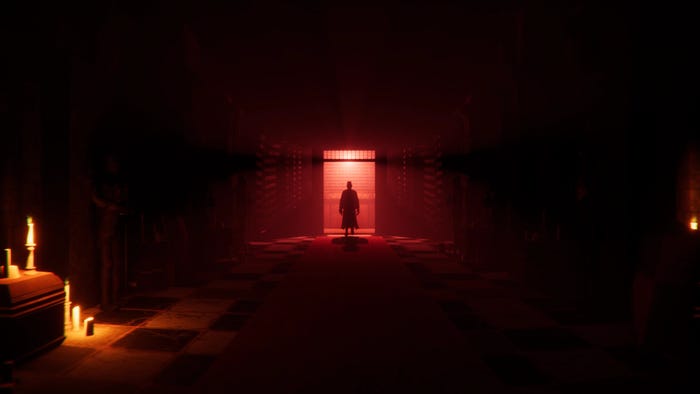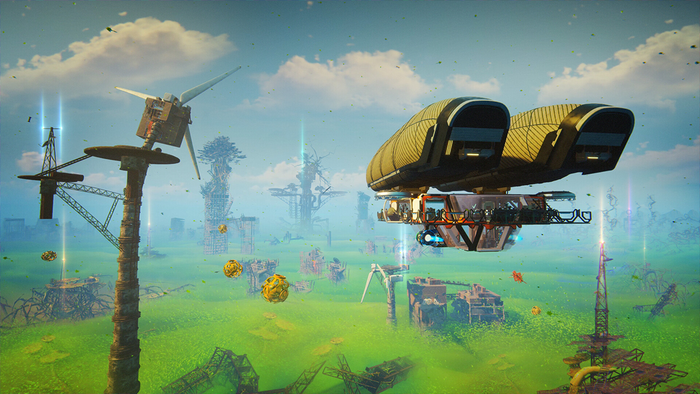One-man design whiz Eskil Steenberg talks his just-launched LOVE, its philosophy of multiplayer dynamic storytelling, and his big goals -- including a very ambitious mandate for his next project.

Eskil Steenberg is a one-man show. The chatty, perpetually-smiling Swede first made a big splash at GDC 2009 when he unveiled his self-made set of intuitive procedural generation tools, and now he's just launched LOVE, a multiplayer open-world game he hopes will showcase the fruits of his labor. LOVE, with its massive persistent universe and team base-oriented collaborative gameplay, resists definition. Its distinctive Impressionist painter vibe has roots in Steenberg's roots as a graphic artist -- although it's programming with which he fell in love. "And when I started programming, the first thing I wanted to do was make better tools for myself," he tells Gamasutra. "And from there, I got uber-technical, and uber-into graphics programming, so I really wanted to make something using my tools. I thought that I had some tools that were really cool, that could really speed up the way that games were made, but I wanted to prove it." Thus LOVE was born, an enormously ambitious and expansive design for a first project. "I've sort of part-time worked for some game companies and helped them with some tech issues, but I'd never designed a game or made any games myself -- which is kind of weird," he admits. Why Do It? "I just am fairly knowledgeable, I guess, when it comes to programming," he says. "Really, making any game is about taking all the ideas for the things you need and coming up with a collection of ideas... people ask me where did I get the idea [for LOVE], and I usually say it's not an idea -- it's lots and lots and lots of ideas," he explains. He spent three years "hacking away" to build the toolset for his own interests, he says. Working so much on one project "gets kind of boring real easily, so you want to constantly come up with new, cool things, and innovate and feel that you're pushing the envelope at any stage of the project just so that you stay interested in what you're doing," he says. LOVE is billed by many critics as an MMO, but Steenberg, who doesn't really play MMOs, says he wouldn't call it that. Like many adult gamers, these days he finds himself time-pressed, and prefers games that can offer a rich experience in 20 to 30 minutes. "Lately i've gotten to this point where i feel that just -- this is very personal, but personally -- I think that my game is much much more interesting than all other games," he says. "I think also that I'm onto something... when you think you're onto something... and I think I'm more and more putting a lot of space between me and the rest of the industry. I think I do things very differently," he reflects. Adds Steenberg: "That doesn't mean that I'm gonna rule the world and be really good and my game's gonna be 'better' it just means that i'm running on a parallel track... from the rest of the industry right now," he says. "That just means that when I play other games, it doesn't really apply to what I'm trying to do." Dynamic Storytelling So he's stopped trying to genre-define LOVE, he says. "My ultimate goal with LOVE -- I think in parts I'm there, and in many parts I'm not really there yet -- is to create a story-based game, but where the story is completely emergent," he explains. That means the world evolves depending on what the players do, he says, without scripted pieces, pre-generated characters or other traditional elements of story-based games. "I'm trying to build game mechanics that would be similar to dramatic puzzle pieces... instruments for creating drama." To create a story, one needs an "object of desire," he asserts, and in most cases it doesn't even matter what it is. LOVE is a first-person game where each player creates a settlement with other players -- together, they build a home base with a shared inventory and shared abilities to which each individual contributes. "In order to get more abilities you go out into the world and find tokens and place them in your settlement, and when you bring them back everyone in the settlement gets them," he says. "It's very, very collaborative." The conflict comes in with other, AI-generated and populated settlements. Players can steal tokens from enemy camps, but then the AI will march on to attack the players' settlements. "It becomes almost like playing a RTS but one where you're playing a peon in an army, and you can decide what to do -- you can stay at home and build, you can explore, you can do all kinds of things," he says. "If you get attacked by an enemy settlement, there won't be characters coming from spawn closets -- they will actually walk through the world and find your settlement and start attacking it," he says. That real sense of time and distance is important to immersion. And when a settlement is destroyed, it leaves a ruin on the world -- a permanent part of the story. "Depending on what players do, they change the history of the world," explains Steenberg. Eliminating The 'I' It seems initially counter-intuitive to a story-driven game that there are no special accouterments for individual characters, especially in an era where prevailing design wisdom for multiplayer online games holds that personalization and customization is essential to engagement. "I don't want you to think about your character at all," Steenberg says. "I want you to think about your settlement. If you build your character in a normal game, you get satisfaction from knowing that you got a level-so-and-so character. But if you build something that other players take part in, that means whatever you contribute will be appreciated by other players." "Nobody's fighting for their own character, but rather fighting for their friends, and that means that the game has a very different sort of social environment," Steenberg says. This is a key element differentiating LOVE from traditional competitive or self-glorifying multiplayer games. Steenberg says that even cooperative multiplayer titles still encourage players to pursue personal glory. But in an environment where players are encouraged only to better one another, "it means there's no real point in being a jerk in the game to other players," says Steenberg. "You're all on the same side; you have common goals." "Most games are about 'I am better than you'; it's kind of trash talk-inviting," he continues. "I don't really care about game mechanics as mechanics. I don't care about what you can do in the game -- I care about other things, like i want the players to feel this particular feeling or I want them to play in this particular way, and then I'll find the mechanic that will get them to do that." And because players share resources, anyone new to a settlement can access the cumulative learnings and items of their team from the moment they jump in. But paradoxically, Steenberg says the multiplayer component of LOVE isn't terribly important to him. When A Social MMO Isn't A Social MMO "Games usually become a lot better when they're multiplayer, but... the kind of game that I want to do would be possible to do as a single-player game," he says. And the reason he disassociates his work from traditional multiplayer or social gaming is philosophical differences: "I think a lot of games right now in that world, they're not actually trying to make a fun game. They're trying to get players," he says. "It's a slot machine psychological thing they're using to get people to kill 50 boars... and in some ways I think those games are kind of immoral because they're not actually trying to be fun. They're trying to be addictive." Steenberg concedes he wants to look at ways to make LOVE a little more sticky, but overall he's pleased with the design even while he hopes to evolve it long-term. "The sales numbers could be better, but I am happy with them," he says. "I never considered it to be a launch game, really, it's a very long-term game and long-term, it looks pretty good." As for feedback, it's been good -- "The mix is 'I don't get it' and 'I love it', and sometimes 'I don't get it, but I love it.'" The challenge is that according to Steenberg there are no comparison points to LOVE and nothing similar players can use as a point of reference, which can be a conundrum in inviting new players. So even though he's looking ahead to his undisclosed next project already, "I don't see LOVE ever ending. In some ways, I feel that I have this amazing world now, and I solved all these boring problems like pathfinding and having a world that can change and is completely buildable... I really don't want to end now because there's so much cool stuff I can do." "And I believe in games as services... because you really continue to improve them indefinitely," he adds. Nonetheless, Steenberg's personal goal for his next project is just as ambitious as LOVE is. Next Stop: Solving RTS On Console? "I am contemplating things -- and I can't tell you what it is exactly, but I can tell you this: I am fairly sure that i have solved how to do realtime strategy on console," he states. "I've had a bunch of people actually try it and they're pretty sure that I've solved it. It's at the level of speed where you can move around similar to a mouse and keyboard. I had some game ideas with that, but it's still early, and I'm kind of busy right now."
About the Author(s)
You May Also Like









